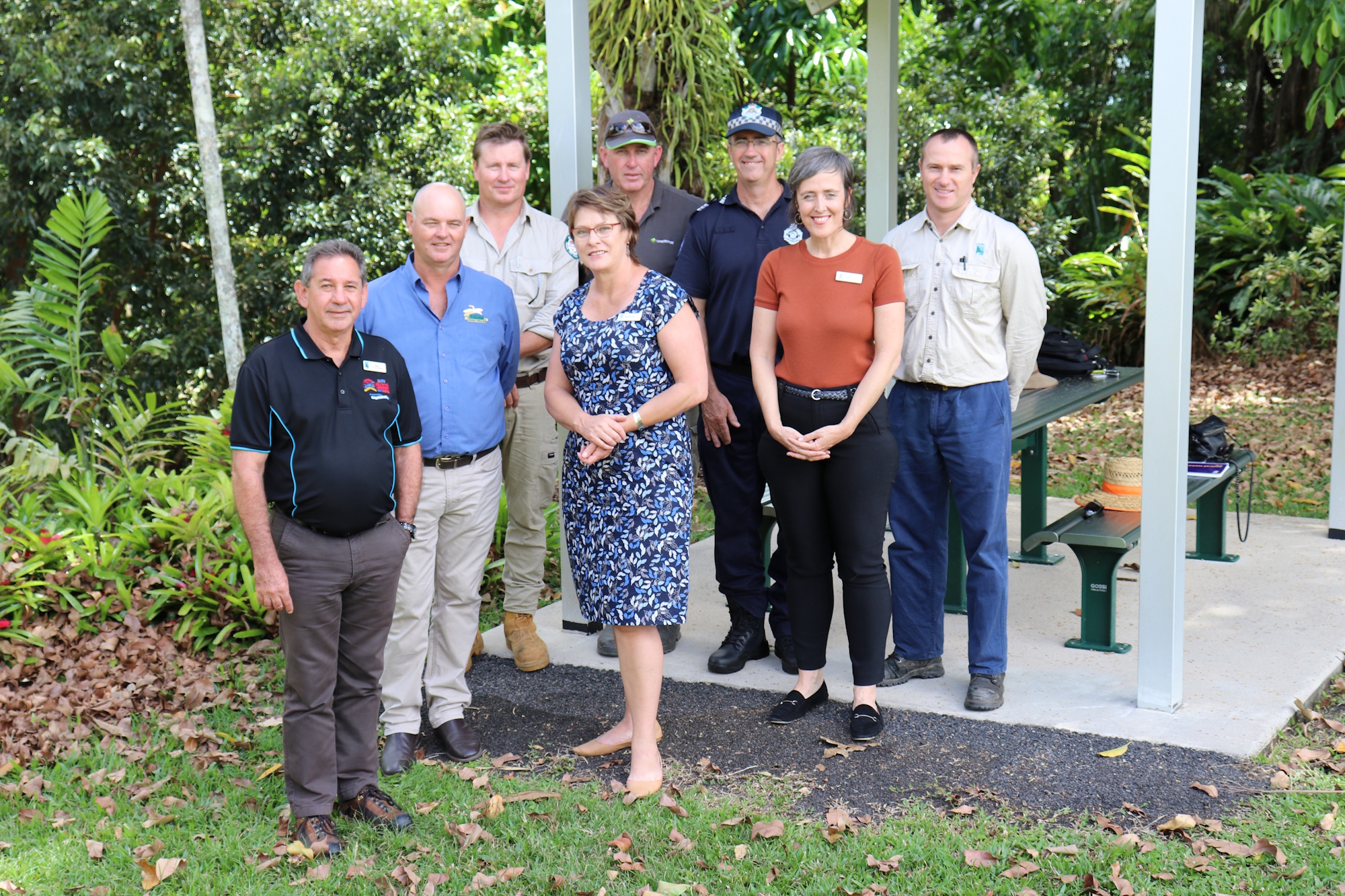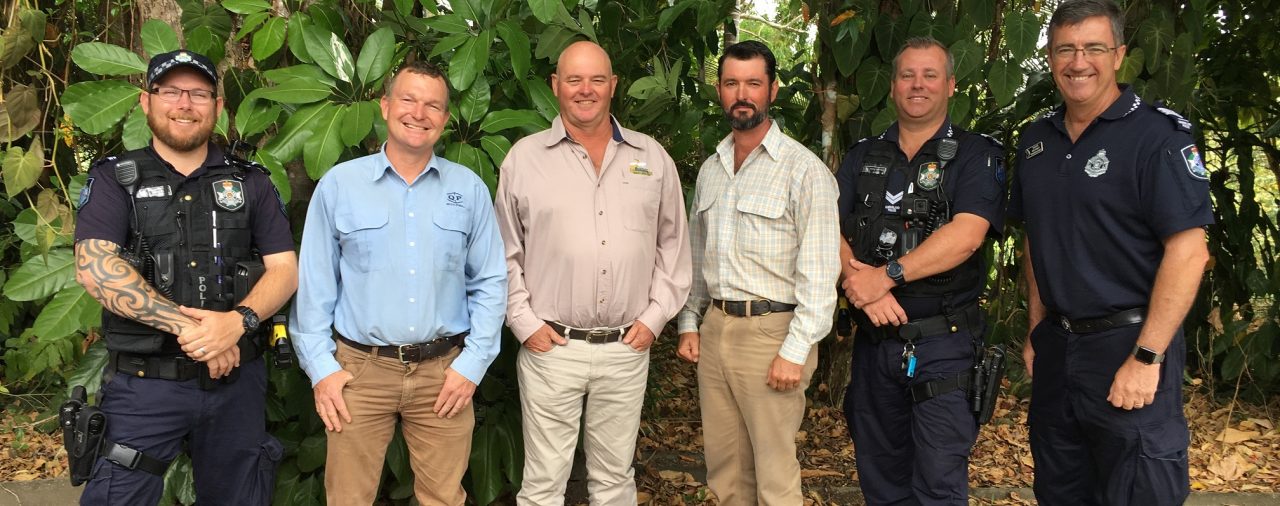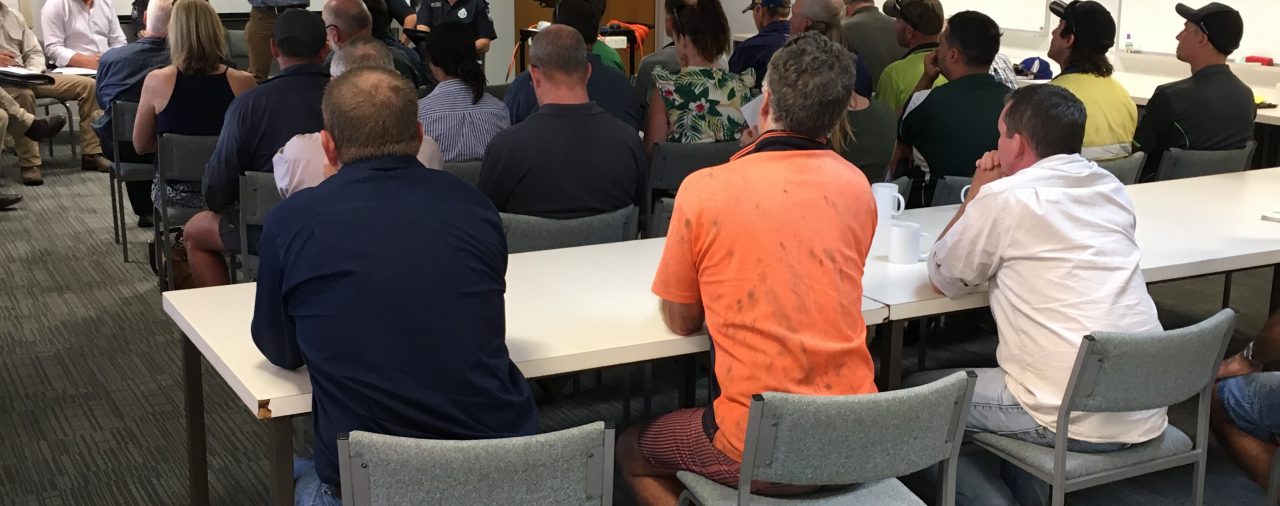
educate the general public about the risk of spreading TR4 by entering farms without permission. Pictured (L-R) Cassowary Coast Regional Council Mayor John
Kremastos, Australian Banana Growers Council Deputy Chair Leon Collins, Brenton Haigh from Queensland Parks and Wildlife Service, Biosecurity Queensland’s
Panama TR4 Program Leader Rhiannon Evans, Tully Canegrowers Deputy Chair Bryce Macdonald, Officer in Charge of Tully police station Sgt Rod Stanley, BQ Panama
TR4 Program Principal Engagement officer Sarah Flenley and Cassowary Coast Council Feral Pig Program Co-ordinator Max Grimbacher.


By Sonia Campbell
A renewed campaign to address growing concerns over the number of people illegally entering banana farms along the Cassowary Coast, has resulted in at least one charge of trespass being laid.
At the time of going to print, a 23-year-old South Johnstone man was due to appear in the Innisfail Magistrates Court on November 25. He was facing one charge of trespass, following a complaint from the Cassowary Coast Regional Council regarding a person allegedly unlawfully entering council land for the purpose of hunting, at East Innisfail on October 20.
The charge followed the launch of a united campaign involving the Australian Banana Growers’ Council, Tully and Innisfail banana growers, Queensland Police, Biosecurity Queensland, Cassowary Coast Regional Council, Canegrowers and the Department of Defence.
The multiple agencies banded together following concerns raised by growers over the increased risk of spreading Panama tropical race 4, from a reported significant rise in trespass onto banana farms in the Innisfail and Tully areas. Most instances of trespass involved pig hunters and tourists; as well as other unrelated acts of crime involving theft and wilful damage.
The concerns were initially raised publicly at the Cassowary Coast Banana Growers’ Association meeting on October 10.
In response, the Australian Banana Growers’ Council organised an urgent meeting with local Queensland Police representatives on October 18 to explain to growers their legal rights, and how to best prosecute anyone illegally entering their farms.
The meeting – lead by ABGC deputy chair Leon Collins and held at South Johnstone – was attended by almost 30 growers, other landholders, Biosecurity Queensland and other associated industry representatives.
The five Queensland Police representatives included two officers from the Mareeba stock squad and officers from Tully, South Johnstone and Silkwood.
They addressed the meeting and answered a variety of questions from growers.
Mr Collins said officers urged growers to report all incidents of trespass to police, so they can investigate and have the best chance of prosecuting offenders. This information will also allow police to establish whether there are any patterns in illegal activity.
“The police did a fantastic job explaining what constitutes ‘trespass’ and how growers can effectively start pursuing prosecutions of these offenders,” Mr Collins said.
“The growers that were present at the meeting said it was very informative and they were very grateful to know that they have the full support of police to start tackling this important issue. “As an industry, we are all aware that we have gone to great lengths to fend off TR4. There is no other country in the world that has had similar success in containing this disease.
“However, just one person, dog or vehicle, entering a banana farm illegally, without adhering to strict biosecurity protocols, puts all of this effort at risk.
“And, if this disease does spread more broadly, it will not only affect farmers’ own livelihoods, but as the main employer and economic driver for the Cassowary Coast, it will also have a huge impact on the local communities that rely so heavily on the industry.”
A joint media event involving all agencies was held on October 28, to help educate the wider community on the importance of not trespassing onto banana properties, emphasising the risk of spreading TR4.
Biosecurity Queensland is also working on an information campaign to better educate tourists about TR4, and the importance of not entering farms without permission.
Key messages:
• To enter private land (including private roads and easements) a person must have permission from the owner. If they don’t, it’s trespass and they can be prosecuted.
• Having ‘No Trespassing’ or ‘Private Property’ signs helps police prosecute.
• A landholder has the right to ask a person for their name and address if they are found trespassing on their land.
• Any person using gazetted ‘stock routes’ must have a permit.
Key actions for growers:
• Report ALL incidents/evidence of trespass to police. Big and small (e.g. a photo of a cut fence or a vehicle registration number). Police need to build a picture of what is happening and all pieces of evidence add up. If it is not reported, they can’t investigate and potentially prosecute.
• All incidents of illegal trespass should be reported directly to your local police station, not Police Link.
• Signage – If your land is fenced, you don’t generally need ‘No Trespassing’ or ‘Private Property’ signage, as a fence indicates a boundary, and crossing that boundary constitutes trespass. However, where there is no fence, ‘No Trespassing’ or ‘Private Property’ signage should be erected. This is to negate any excuse for someone entering your property without permission. Essentially, the offender cannot use the excuse, ‘I didn’t know this was private land’.
• Set up trail cameras where you can.
